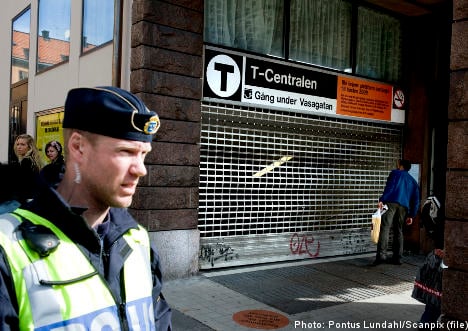The incident occurred when the officer spotted the 19-year-old woman handing over her transportation card to her boyfriend in Stockholm’s T-Centralen metro station.
The officer took the woman into custody in December at T-Central and took her to one of SL’s, the local public transportation authority, premises sometimes used to hold suspects.
Inside, he pushed her down on a chair, kicked her in the leg and pulled her hair, which, according to the indictment, resulted in pain. He then pushed the woman down onto the floor and twisted her left arm behind her back, breaking her arm.
The officer said took the woman into custody because she tried to hand over her transportation card to her boyfriend so that they could both travel on the same card. He claimed that the woman fell and struck her arm on a chair or floor while he and another officer were holding her in a loose grip.
The policeman is accused of unlawful detention, assault and causing bodily injury or misconduct. He will also be prosecuted for several cases of illegal misuse of computer information after he read complaints against police officers without authorisation.
The majority were against him, including the notification submitted by the woman.
Chief prosecutor Christer Ekelund wrote the summons application that the intervention against the woman was without basis in the law because she did not disturb public order. The violence the policeman used was unjustifiable, the indictment said.
The evidence includes footage from a surveillance camera, the testimonies of the woman’s companions and a court affidavit attesting the origin of the injury.
The National Police Board’s (Rikspolisstyrelsen) disciplinary board will provide its opinion on the matter to determine whether the policeman should be dismissed on a possible conviction verdict.
The woman’s assistant prosecuting lawyer, Ann-Charlotte Westlund, would not comment on the case until after the trial, which will take place sometime in the autumn.



 Please whitelist us to continue reading.
Please whitelist us to continue reading.
Member comments